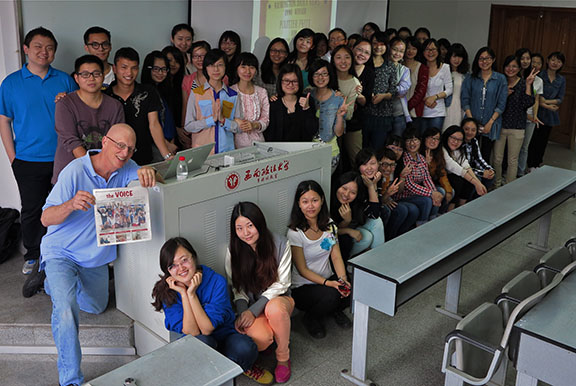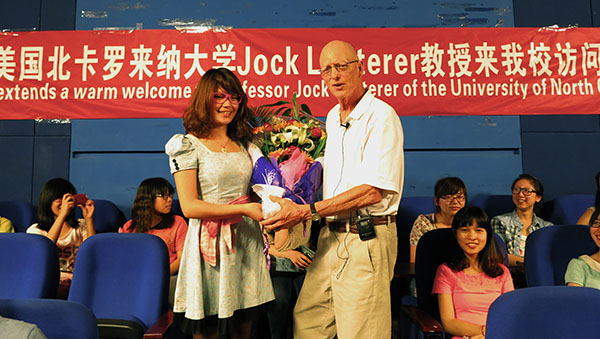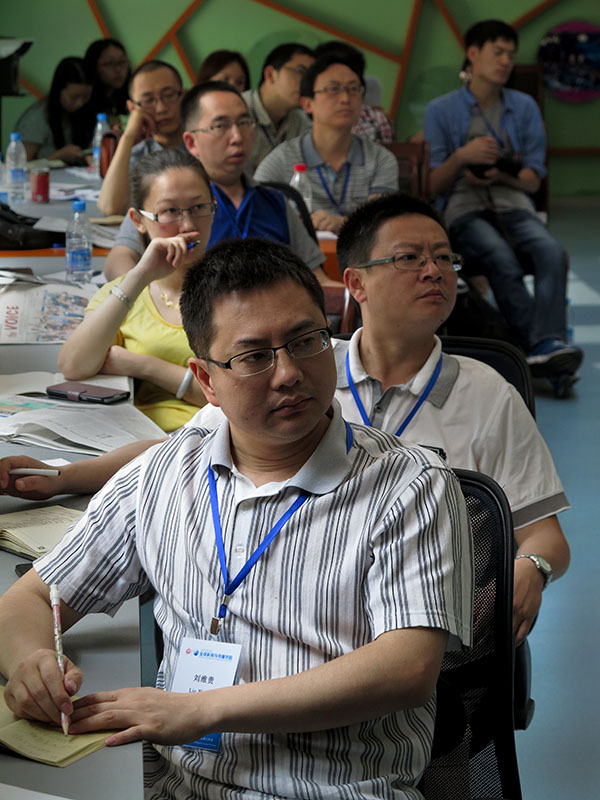Our intrepid traveler is three weeks into a month of lecturing at conferences, newspaper workshops and universities in Shanghai, Chongqing, Hefei and Zhengzhou, China. This follows last summer’s Fulbright to Beijing, where he taught at three universities, and where at one workshop, he was introduced as “Mr. Joke.” Herein follows Mr. Joke’s reprise.

The last two weeks have been a whirlwind of classes, lectures, workshops and working power-dinners. Unforgettable vignettes jump out from my Reporter’s Notebook like a slide-show:
Click: Following a two-hour presentation and PowerPoint about U.S. Community Journalism, a boy in the back of the big lecture hall raises his hand and asks his question. Do you like Justin Beiber?” And after the laughter has subsided, he continues, unabashed, “What music do you like? What’s your favorite book? And movies?” I love this line of questioning, and answer in order: “Jazz, Henry Kissinger’s book, “ON CHINA,” and “The Shawshank Redemption.” Heads nod in appreciation.
Click: I have been asked to give a lecture on the Social Responsibilities of the Community Photojournalist. Today’s lecture is held in a large, brightly lit TV studio packed with at least 200 students, faculty and the deans. In the back is a humongous yellow-on-China-Red banner screaming: “SWUPL Extends a Warm Welcome to Professor Jock Lauterer of the University of North Carolina at Chapel Hill.” It’s a China thing, my host tells me. Banners are customary, and making them is big business in town. They also surprised me when they trotted out a young woman who appeared to be their reigning campus beauty queen who presented me with an oversized bouquet of flowers. A first, for the ol’ perfesser. The lecture itself was a huge success, until halfway through, I realized that one of the photographs in my collection is the iconic shot from the student demonstrations at Tiananmen Square 1989— the photograph of the lone demonstrator standing in front of, and facing down, a line of tanks. I had about two seconds to make the call: this was the wrong place at the wrong time to show that image and make a scene. Later — in another setting, to another audience — perhaps. But not now, not today. The image flashed on the screen for a mere second; and I think I saw one of the deans in the front row respond with a startled look of recognition; I can’t be sure about that. But she seemed to be the only one who had spotted it. Instantly, I dumped that PowerPoint and turned to a Plan B, and competed the lecture without incident, feeling an odd mix of elation and the urge to go back to the hotel and wash my hands.

Click: The auditorium at Southwestern University across town in Chongqing is packed to the rafters with at least 200 kids. The topic is New Media and the U.S. Newspaper Industry, which lets me talk about the impact of social media. And when we get to the topic of blogs and blogging, I asked the students, “How many of you have your own blog?” And fully one half of the audience raised their hands! “Who pays you for your work?” I asked. They all stared back and shook their heads. “So you do if for free?” Yes, they nodded as if one. “Then, why do you do it?” I asked. And some of the responses were memorable: “ I do it because it lets me express myself,” said one girl. “Another student said, “I do it to communicate for my own interest.” And another: “I want to share my ideas with others. It’s an expression of yourself.” And finally a serious young man said, “I want to explain my views, share my life and accentuate democracy.” Sounds like free speech to me.
Click: After another lecture, I am in a taxi with one of the J-school faculty members who challenges me out of the blue. Her question relates to the New York Times reporter who this year won a Pulitzer for exposing a corrupt Chinese leader high up in the government. She wanted to know, had I read the story — and more importantly, how could we know that the story wasn’t fabricated and a pack of lies? I was flummoxed, for I had to confess that I had NOT read the story, but was quick to tell her I knew OF the story. And most importantly that I TRUSTED the NYT. Because in our media system, if a reporter fabricates, fakes or embellishes a story, especially one of such heft and weight, he or she will be found out, exposed and busted. That led to a marvelous conversation about media veracity, credibility and trust — during which time I was told, “Trust is something that is in great scarcity in China.”

Click: The toughest crowd yet was yesterday’s workshop with working journalists from Chongqing’s three major metro daily newspapers. These were not dewy-eyed students yearning for careers as famous TV anchors. These journalists were the sort you find in newsrooms the world over: seasoned professionals, worldy-wise and difficult to impress, and who knew how to bang out a story on deadline. But now their upper-level management was telling them to change their style; there was this new thing called Community Journalism, and that they were going to have to change and adapt to something new and perhaps even threatening and unsettling. Yesterday’s session reminded me of a similarly challenging workshop from years ago back in the U.S. where I had been asked to lead a workshop on Community Journalism for reporters at a major metro daily paper. To put it succinctly, it did not go well. All the way through the presentation the reporters sat dutifully in a dimly-lit dungeon-like room unsmiling, glaring at me, as if to say, “Are you DONE yet?! We’ve got more important things to do than to listen to your drivel.” But I get the last laugh: it’s 10 years later and now Warren Buffett owns their paper. Welcome to Community Journalism, boys. Did we succeed yesterday with the hard-bitten journalists from Chongqing? As my Chinese hosts have taught me to say philosophically, “Who knows?”

